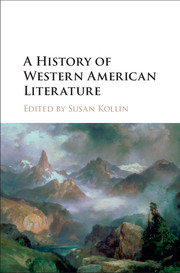Book contents
- Frontmatter
- Contents
- Notes on Contributors
- Acknowledgments
- Introduction: Historicizing the American Literary West
- PART I HOMELANDS
- 1 Indigenous Memories and Western American Literary History
- 2 The Recovery Project and the Role of History in Chicano/a Literary Studies
- PART II MAKING A REGION
- PART III GEOGRAPHIES OF THE LITERARY WEST
- PART IV THE TWENTIETH CENTURY AND BEYOND: LITERARY MOVEMENTS AND CRITICAL PERSPECTIVES
- Selected Bibliography
- Index
2 - The Recovery Project and the Role of History in Chicano/a Literary Studies
from PART I - HOMELANDS
Published online by Cambridge University Press: 05 November 2015
- Frontmatter
- Contents
- Notes on Contributors
- Acknowledgments
- Introduction: Historicizing the American Literary West
- PART I HOMELANDS
- 1 Indigenous Memories and Western American Literary History
- 2 The Recovery Project and the Role of History in Chicano/a Literary Studies
- PART II MAKING A REGION
- PART III GEOGRAPHIES OF THE LITERARY WEST
- PART IV THE TWENTIETH CENTURY AND BEYOND: LITERARY MOVEMENTS AND CRITICAL PERSPECTIVES
- Selected Bibliography
- Index
Summary
In 1990 at virtually the same time Paul Lauter was finalizing what was then the most significant revision to the study of American literature, the Heath Anthology of American Literature – which was also a geographic remapping of literary history – and the New Western Historians were revisiting Frederick Jackson Turner's “Frontier Thesis” in general and Herbert Eugene Bolton's “Spanish Borderlands” in particular, an independent but quite complementary inquiry into the origins, legacies, histories, and politics of Hispanic literature in the United States was being launched. By all accounts, the Recovering the U.S. Hispanic Literary Heritage Project has been successful, if not wildly successful. With the mission to locate, preserve, evaluate, and publish materials written between the colonial period and 1960 and by individuals we would consider Hispanic, it has recovered and forwarded “letters, diaries, oral lore and popular culture by Cuban, Mexican, Puerto Rican, Spanish and other Hispanic residents of what has become the United States,” including newspapers and periodicals.
Over the last twenty-five years, the Recovery Project has created and promoted a national and international framework for reconstituting the longue durée of a “Hispanic” presence in what would become the United States of America. While the Project has always had a three-prong set of goals – archival preservation; publication of important, heretofore unavailable texts; and curricular reform from K–12 to university – one of the major consequences has also been a recovery and remapping of the settler colonialisms of North America. Through its publications, the Recovery Project has been able to rehistoricize and respatialize the imaginaries of what constitutes U.S literature, from Spanish North America to the beginning of the civil rights period (1492–1960), for a diverse set of Hispanic communities. This new historical and geographic literacy is readily apparent in the early publications of the Recovery Project.
Although other translations were available, the publication of The Account: Álvar Nuñez Cabeza de Vaca's Relación in 1993 by the recovery scholars Martin A. Favata and José B. Fernández was responding not only to critical attention to narratives of contact, but also to increased attention to the points of entry, journey, and exits of European conquistadors, missionaries, fortune seekers, and so on. Cabeza de Vaca's failed expedition begins in Cuba. With one mishap after another, he becomes stranded and captive in Texas by Natives and is reunited with Spanish compatriots only after years of hardship.
- Type
- Chapter
- Information
- A History of Western American Literature , pp. 31 - 46Publisher: Cambridge University PressPrint publication year: 2015

